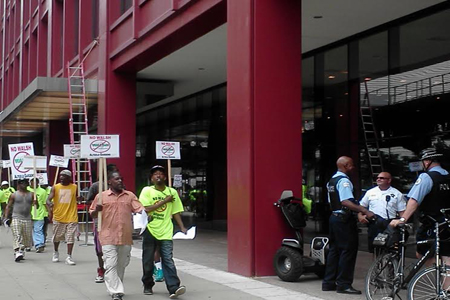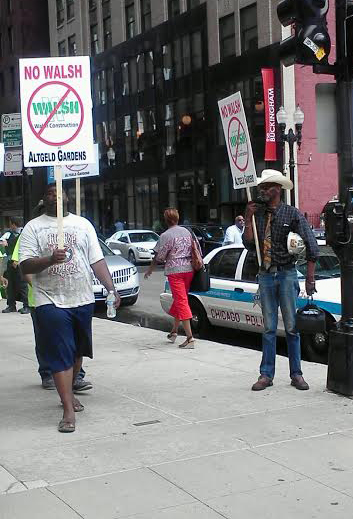
CHICAGO–Black contractors said they are tired of losing out on jobs in their own communities, especially to large companies that find ways around the very law that is supposed to ensure diversity. So as the Chicago Housing Authority opens a bidding process for the project of renovating a South Side public housing community, residents, organizations and Black contractors are demanding that one company be excluded from the bid.
The city’s largest general contracting and construction firm, according to Crain’s Chicago Business, is Walsh Construction Company. Some Black contractors said Walsh always seems to get awarded projects, while the minority businesses are left on the sidelines. There have also been discrimination suits against the company in the past. The midwest-based company has regional offices across the country, operating by using Union Labor and Union Subcontractors.
No company representative returned the Chicago Defender’s messages and emails by deadline.
Section 3 of the Housing and Urban Development Act of 1968 states that Public Housing Agencies, like CHA, and their contractors and subcontractors must do their best to award contracts to businesses that will provide jobs for low income individuals. HUD also requires that those agencies and their contractors offer low-income people training and employment opportunities generated by any public housing development, operating subsidies and modernization assistance.
The issue some said is that until someone enforces this federal law, nothing will change.
“Black contractors and workers have lost out on nearly $160 million in contracting opportunities and over 15,000 construction related jobs in the last five years due to CHA and other recipients of HUD funding not enforcing this important federal law,” Arness Dancy, Chicago Black Chamber of Commerce president said.
An audit done through the Office of Inspector General last June found that HUD was not enforcing the reporting requirements of Section 3. In the document it states that the audit took place “due to concerns over HUD’s ensuring economic opportunities for low and very low-income persons.”
Because HUD was not collecting its Section 3 summary reports from all the housing authorities or verifying their accuracy there was a chance 1,650 housing authorities could have falsely certified compliance. Another issue, according to the audit, was that housing authorities were not providing HUD or the general public with “adequate employment and contracting information.”
HUD’s problem trickles down to CHA, which in turn, affects minority workers and contractors who say they can’t get jobs. On June 24, nearly 100 men and women protested outside of CHA, demanding that Walsh Construction not be considered in the bid for the rehabilitation of Altgeld Gardens on the city’s South Side.
 The 157 acre public housing development is going through renovation, which will happen in six phases over a span of eight years.
The 157 acre public housing development is going through renovation, which will happen in six phases over a span of eight years.
“There’s enough work that African Americans should be working,” said Patricia Davis of Unique Case Work. Her company helps Black workers get jobs on construction projects. She said too often she sees majority white workers in predominantly Black communities.
There have been plenty of discussions in the past between some of the organizations which support Black labor and the Chicago Housing Authority, but nothing has really changed, Attorney Robert Whitfield said.
Whitfield’s practice areas include employment law for employees and civil litigation. Right now he is representing three Altgeld Gardens’ residents in a pending federal suit against Walsh. Whitfield said CHA is not making primary contractors abide by Section 3 in their hiring process.
In an email statement, CHA said:
The Chicago Housing Authority is committed to working to build strong, vibrant communities throughout Chicago. As CHA works to ensure the safety and sustainability of properties within its portfolio, the agency ensures that all contractors adhere to compliance requirements as mandated by HUD. Ensuring Compliance with M/W/DBE, Section 3, and Davis-Bacon is an important role for CHA. We see every contract andwork with every vendor to meet and exceed our goals and requirements.
The CHA Board of Commissioners has not approved a vendor for the Altgeld Gardens contract, CHA spokeswoman Wendy Parks said.
Kerry Young of Kerry Young Developer LISC was one of the African American bidders, but was told he didn’t meet all qualifications. He said he met with CHA and they explained to him and his team which areas they can improve in, but Young said he didn’t agree with everything.
“We just want a clear, open process that provides an equal opportunity,” he said.
Section 3 requires that 30 percent of all new hires must be Section 3 employees, which includes CHA and low-income Chicago area residents. Contractors must follow CHA’s hiring process. In 2013, Mayor Rahm Emanuel ordered that construction projects require neighborhood residents to be hired for at least 7.5 percent of labor hours on any city construction contract that are more than $100,000. The goal is to make sure residents benefit from the economic opportunity that is happening in their own neighborhood, the mayor said in a press release.
Even with this, some Black contractors are still saying nothing has changed. There needs to be more transparency and elected officials really need to do their job, they said.
“Mayor Emanuel is going to have to step in to help right this ship,” said Dancy.
“You hear elected officials saying they want [transparency], but there needs to be a Section 3 office set up in City Hall,” he said.
Omar Shareef is the founder of the African American Contractors Association and he said no one above is enforcing Section 3 so nothing happens.
“For some reason our aldermen aren’t demanding it,” he said. “It’s our leaders’ fault.”
Often, big contracting companies say that the person applying for the job must be in the union to work on the project, said Whitfield, but there is no mention of unions under Section 3.
“It’s useless because everybody says we like to have residents, but we can’t get around the union and that has been a problem going back to the 1960s,” he said.
Some of the protesters said if more jobs are created and given to minorities that would also help when it comes to solving Chicago’s violence.
“To really stop the violence, we need to bring in more jobs,” said Levern Murphy, with The Busy Man Construction: Property Restoration Maintenance Services. But he said it won’t happen right away because this is a “political” game.
The protesters said they will march every day until they get a response from CHA.
